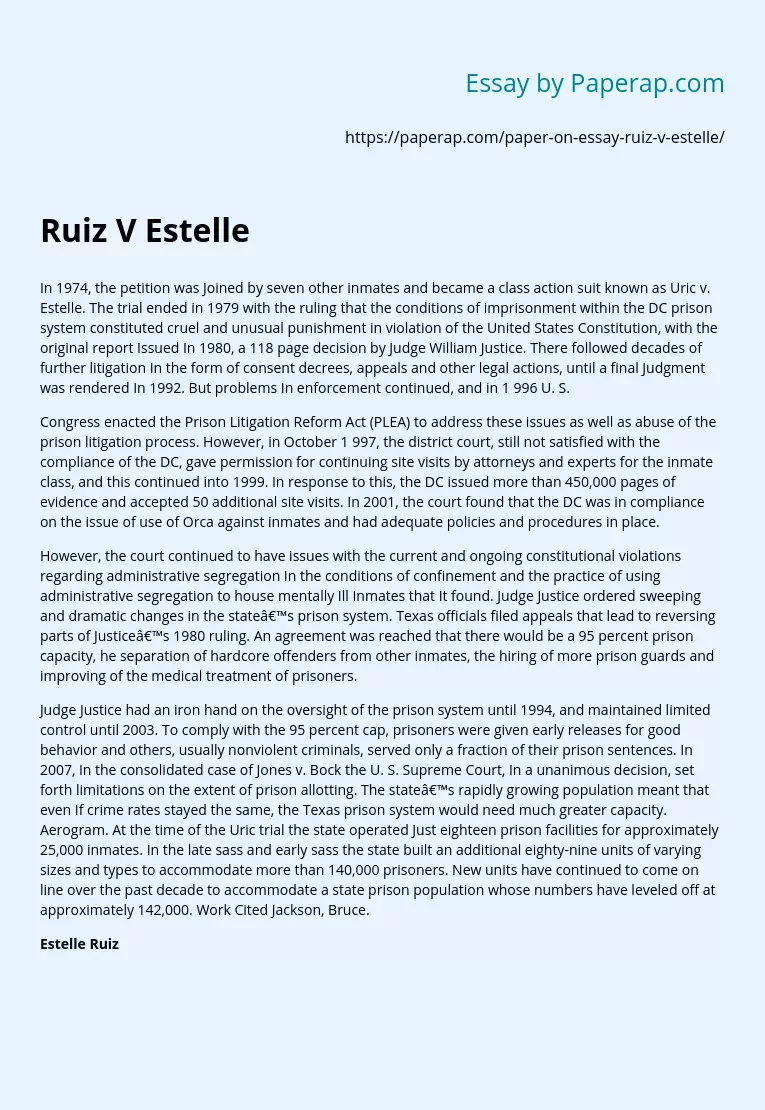Class Action Suit Uric v Estelle: 1974-1979 Ruling
In 1974, the petition was Joined by seven other inmates and became a class action suit known as Uric v. Estelle. The trial ended in 1979 with the ruling that the conditions of imprisonment within the DC prison system constituted cruel and unusual punishment in violation of the United States Constitution, with the original report Issued In 1980, a 118 page decision by Judge William Justice. There followed decades of further litigation In the form of consent decrees, appeals and other legal actions, until a final Judgment was rendered In 1992.
But problems In enforcement continued, and in 1 996 U. S.
Congress enacted the Prison Litigation Reform Act (PLEA) to address these issues as well as abuse of the prison litigation process. However, in October 1 997, the district court, still not satisfied with the compliance of the DC, gave permission for continuing site visits by attorneys and experts for the inmate class, and this continued into 1999. In response to this, the DC issued more than 450,000 pages of evidence and accepted 50 additional site visits.
In 2001, the court found that the DC was in compliance on the issue of use of Orca against inmates and had adequate policies and procedures in place.
However, the court continued to have issues with the current and ongoing constitutional violations regarding administrative segregation In the conditions of confinement and the practice of using administrative segregation to house mentally Ill Inmates that It found. Judge Justice ordered sweeping and dramatic changes in the state’s prison system. Texas officials filed appeals that lead to reversing parts of Justice’s 1980 ruling.
An agreement was reached that there would be a 95 percent prison capacity, he separation of hardcore offenders from other inmates, the hiring of more prison guards and improving of the medical treatment of prisoners.
Judge Justice had an iron hand on the oversight of the prison system until 1994, and maintained limited control until 2003. To comply with the 95 percent cap, prisoners were given early releases for good behavior and others, usually nonviolent criminals, served only a fraction of their prison sentences. In 2007, In the consolidated case of Jones v. Bock the U. S. Supreme Court, In a unanimous decision, set forth limitations on the extent of prison allotting. The state’s rapidly growing population meant that even If crime rates stayed the same, the Texas prison system would need much greater capacity. Aerogram. At the time of the Uric trial the state operated Just eighteen prison facilities for approximately 25,000 inmates. In the late sass and early sass the state built an additional eighty-nine units of varying sizes and types to accommodate more than 140,000 prisoners. New units have continued to come on line over the past decade to accommodate a state prison population whose numbers have leveled off at approximately 142,000. Work Cited Jackson, Bruce.
Estelle Ruiz
Class Action Suit Uric v Estelle: 1974-1979 Ruling. (2019, Dec 05). Retrieved from https://paperap.com/paper-on-essay-ruiz-v-estelle/

